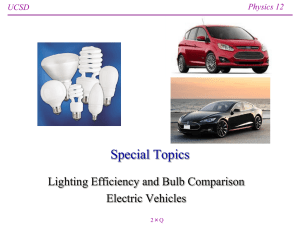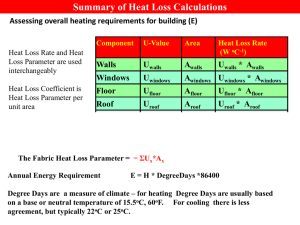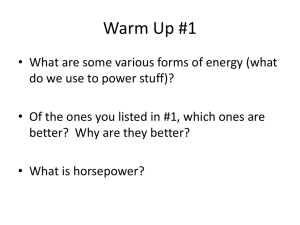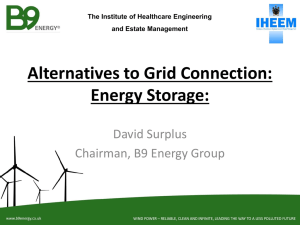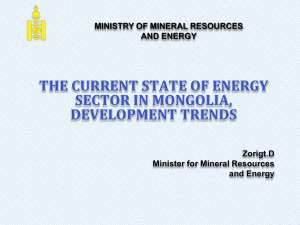Energy Storage Applications - Resource Management & Planning
advertisement
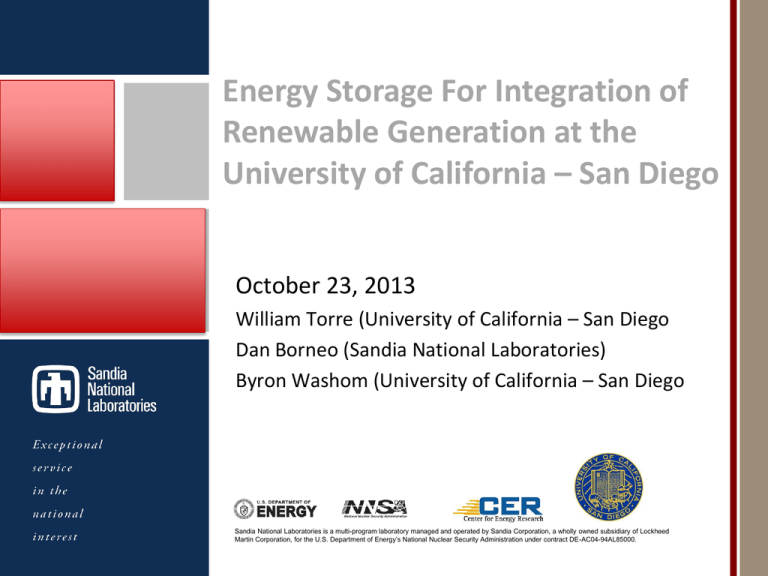
Photos placed in horizontal position with even amount of white space between photos and header Photos placed in horizontal position with even amount of white space between photos and header Energy Storage For Integration of Renewable Generation at the University of California – San Diego October 23, 2013 William Torre (University of California – San Diego Dan Borneo (Sandia National Laboratories) Byron Washom (University of California – San Diego Sandia National Laboratories is a multi-program laboratory managed and operated by Sandia Corporation, a wholly owned subsidiary of Lockheed Martin Corporation, for the U.S. Department of Energy’s National Nuclear Security Administration under contract DE-AC04-94AL85000. UC San Diego 42 MW Microgrid Campus Quick Facts With a daily population of over 45,000, UC San Diego is the size and complexity of a small city. As a research and medical institution, we have TWO times the energy density of commercial buildings 12 million sq. ft. of buildings, $200M/yr of building growth Self generate 92% of annual demand •30 MW natural gas Cogen plant •2.8 MW of Fuel Cells installed •2.2 MW of Solar PV installed, with another 0.8 MW planned in 2013 2 Energy Storage Projects at UCSD 30 kw, 30 kWh Sanyo/Panasonic Li-Ion battery energy storage system, integrated with 30 kW PV 125 kW, 300 kWh, ZBB Zinc – Bromine Flow Battery – CSI Demand reduction demonstration 120 kW / 65 kWh 2nd life EV Battery Test Stand NREL- CCSE 108 kW, 180 kWh BMW, demonstration of application of 2 nd use EV batteries, direct DC coupling to PV, and Fast EV DC Charging 2.5 MW, 5 Mwhr, SGIP Advanced Energy Storage RFP recently issued 730 kW, 1460 kwhr SGIP PV Integrated, five off campus sites 30 kW, Maxwell Labs, Ultracapacitors, CPV smoothing of intermittency, coupled with solar forecasting 3.8 Million Gallon Thermal Energy Storage 3 Panasonic/Sanyo PV Integration Storage Operational 30 KW / 30 kWh Lithium-ion Energy Storage Configured in 20 cassettes 1.5 kW each 4 Energy Storage Integrate with PV to Demonstrate Intermittency Smoothing Panasonic/Sanyo fully integrated 30 kW PV and 30 kWh electric energy storage • Solar Forecasting System coupled to energy storage controls to mitigate intermittency • Peak shaving to reduce the energy use/cost. • Provide stable and efficient energy. • Ancillary Function (emergency power back up for communication etc) 5 Sanyo Energy Storage PV Intermittency Smoothing 6 ZBB/Sunpower / DNV Kema CSI Flow Battery Demonstration • ZBB EnerStore V3 25 kW / 50 kWh • DC Efficiency up to 76% • Six units with 300 kWh total capacity • Directly coupled with 60 kW of roof top PV • Control system designed to reduce peak load demand requirements at East Campus Chiller Plant 7 Repurposed (2nd Life) Electric Vehicle Battery Testing Testing four EV battery packs simultaneously with various duty cycles representing stationary storage applications • • • • 120 kW/ 60 kWh of total energy storage capacity Test stand linked to Microgrid control system and remotely controlled. Plug-in vehicle batteries degraded to 70-80% of original power or energy capacity are insufficient for automotive use These “retired” batteries may still be highly capable and could be low cost source for stationary energy storage applications 8 BMW 2nd Use EV Battery Energy Storage Objective: Objective: Demonstrate the feasibility of integrating and controlling multiple 2nd life repurposed MINI E battery systems, with additional integration of PV solar array and the UCSD micro grid for a three year period. Research possibilities and value: • Investigate test applications and load profiles. • Results will lead to better understanding of different use cases and possible B2U scenarios • Identify control issues related to managing multiple repurposed EV batteries with a different state of charge. • First full scale energy storage system with repurposed EV batteries.. 9 2nd Life EV Battery Energy Storage Testing Stationary Energy Storage Applications Energy Storage Applications Electric Energy Time-shift Electric Supply Capacity Load Following Area Regulation Electric Supply Reserve Capacity Voltage Support Transmission Support Transmission Congestion Relief T&D Upgrade Deferral Substation On-site Power Time-of-use Energy Cost Management Demand Charge Management Electric Service Reliability Electric Service Power Quality Renewables Energy Time-shift Renewables Capacity Firming Wind Generation Grid Integration Important Metrics per Duty Cycle 1)Annual operational days/hours 2)Number of cycles per given time period 3)Average DOD per cycle 4)Energy throughput per kWh of available capacity 5)Financial value per kWh 6)Value per kWh of available energy capacity and C-rate 10 UCSD SGIP Bulk Energy Storage Project • 2.5 MW, 5 MWhr, bulk energy storage • Reduce Peak Campus demand energy cost production • Integrated with PV and fuel cell and campus cooling load 11 Maxwell Labs Ultracapacitor Energy Storage Key Design Parameters Phase I: 28 kW, 5 minute energy storage Phase II: 250 kW, 5 minute energy storage PV solar smoothing and firming, improve PV ramping Coupled with 28 kW Concentrated PV Control Strategies to be tested Solar predictive forecasting coupled with control systems Schedule: June, 2013 – Nov. 2015 12 Real Time Control of High Resolution Data 13 Coordinated Control and Dispatch of Distributed Energy Storage Resources To Maximize System Efficiency UCSD Campus Load and Generation Requirements 2nd Life EV Battery Test Stand 2.5/ 5 Mwhr EnergyStorage System Sanyo 30 kW/ 30 kWh Energy Storage ZBB 125 kW/ 300 kWh Flow Battery Master Microgrid Controller BMW B2U 108 kW/ 180 kWh Maxwell 28 kW Ultra Caps Solar Forecasting For PV Resource Prediction 14 Summary of UCSD’s Energy Storage Program Large diversified energy storage projects in university setting Planning to grow collaboration with DOE/SNL on energy storage Centralized and Distributed intelligence to control energy storage fleet dispatch Campus energy cost savings potential significant Living laboratory for testing and determining the benefits for various energy storage technologies Lab To Market proven capability Valuable research to aid integration of increasing levels of renewables Opportunity to realize benefits in a true microgrid operational setting 15 Contact Information William V. Torre University of California – San Diego 858-692-2592 wtorre@ucsd.edu Dan Borneo Sandia National Laboratories 505-263-0363 drborne@sandia.gov 16 Acknowledgements Thanks to the following for their support of these energy storage projects at UCSD California Energy Commission (CEC) PIER program grant Renewable Resource Management at UCSD, 500-10-043 , Distributed Energy Storage Systems Sanyo – Panasonic Multi-Disciplinary Research Agreement for Renewable Energy National Renewable Energy Laboratory and the California Center for Sustainable Energy (CCSE), CEC, SDG&E, Assessment of Plug-in Electric Vehicle (PEV) Lithium-Ion Batteries in Second-Life Applications California Public Utility Commission (CPUC) Small Generator Incentive Program (SGIP), 2.5 MW/ 5 Mwhr ES CPUC California Solar Initiative (CSI), ZBB, Sunpower, DNV/Kema, ZBB 125 kW / 300 kWhr ES CEC PIER, Maxwell Technologies, Ultracapacitor Project Dr. Imre Gyuk and DOE’s Office of Electricity for their support of the Energy Storage Demonstration Projects at UCSD. 17

